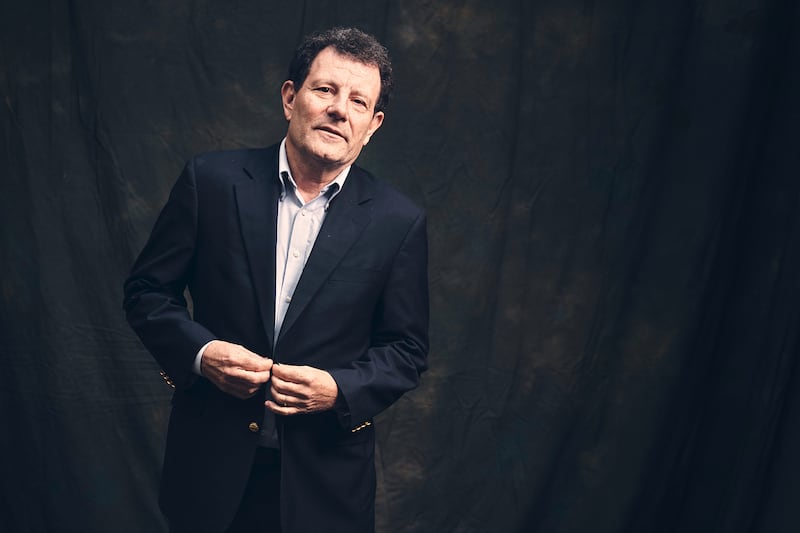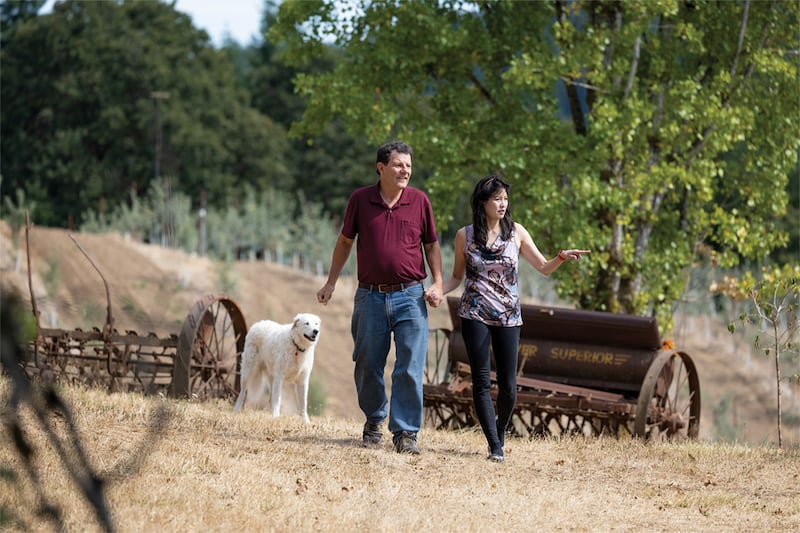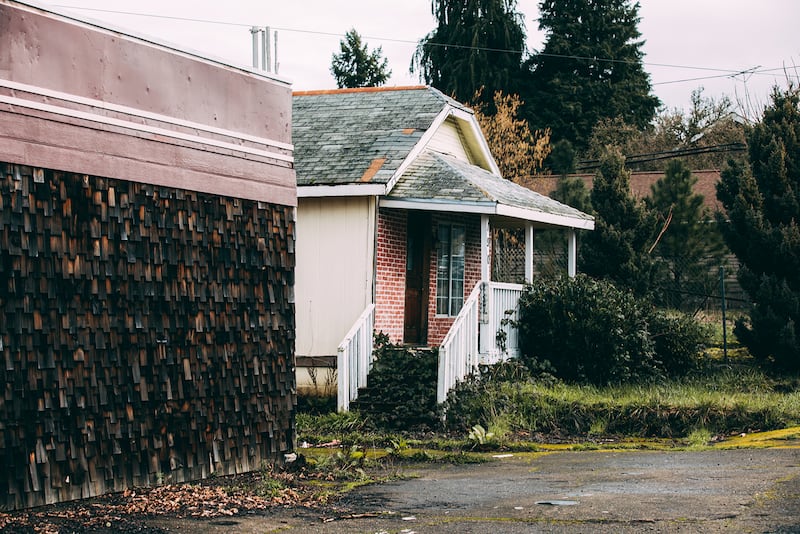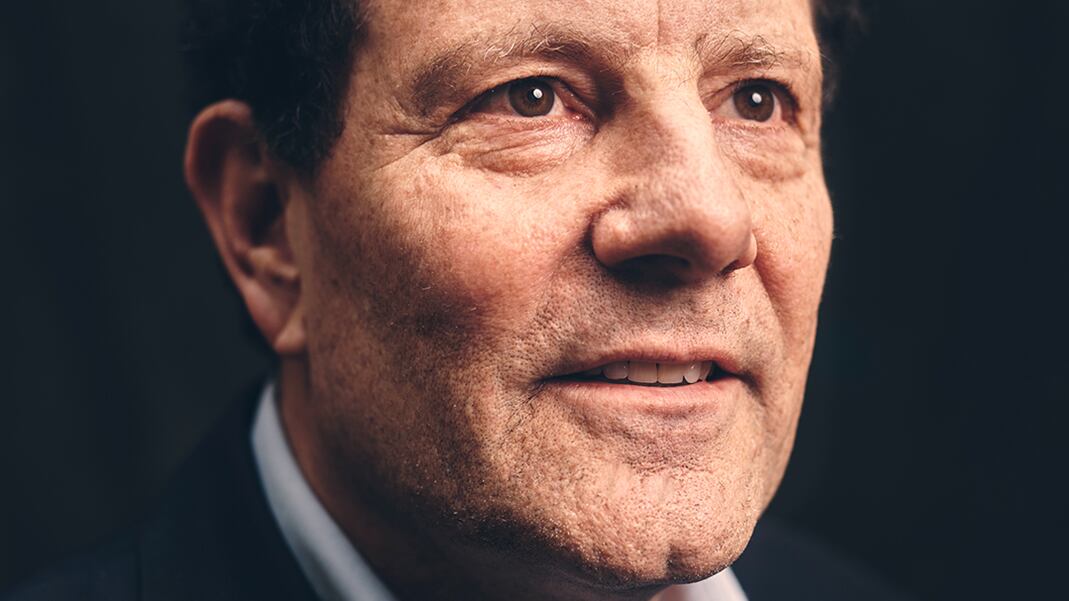In what may be the most interesting Oregon governor’s race in a generation, Nicholas Kristof presents its greatest mystery.
He is such an outsider to Oregon politics that, until last November, he voted in New York.
Kristof, 62, grew up in the town of Yamhill, earned a Rhodes Scholarship at Harvard, then spent 37 years as a reporter and columnist at The New York Times.
The globe-trotting journalist has rubbed shoulders with world leaders, reported from 160 countries, and written five bestselling books with his wife, Sheryl WuDunn. But he’s campaigning on his heritage as a farm boy, the son of an Armenian refugee. Kristof and WuDunn’s 2020 book Tightrope is about the fate of his schoolmates—a high percentage of whom wound up addicted, homeless or prematurely dead—and this frustration fuels his campaign.
Kristof argues he’s ready to rescue Oregonians from lousy schools, a broken mental health system, and an epidemic of homelessness.
During his journalism career, the two-time Pulitzer Prize winner introduced readers to the complexity of an emerging China and genocide in Sudan. His challenge now: to convince voters that his lack of managerial and political experience is a benefit, not a weakness.
Polling shows Oregonians are feeling cranky. That could be a benefit to an outsider, particularly when the two other leading candidates in the 2022 Democratic primary—House Speaker Tina Kotek (D-Portland) and State Treasurer Tobias Read—look much like the governors Oregon has elected for the past three and a half decades.
Oregon has seen 35 years of Democratic dominance in the governor’s mansion: Neil Goldschmidt, Barbara Roberts, John Kitzhaber, Ted Kulongoski, Kitzhaber (again) and Kate Brown. All but Goldschmidt worked their way up the ladder of state government, spending at least a decade in elected office in Salem before winning the governor’s job. Their legacy: Voters statewide feel a vague dissatisfaction with rule by Democratic insiders.
“In the current political environment, it’s refreshing to have someone who doesn’t have baggage and history,” says Chuck Sheketoff, former director of the Oregon Center for Public Policy, who is supporting Kristof.
That is Kristof’s opportunity. He is challenging a partisan steamroller in which Kotek and Read are reliable cogs. Like Tom McCall, the journalist-turned-governor (1967-75) to whom he aspires to be compared, Kristof hopes Oregonians want a visionary and a communicator rather than a career politician.
Former state Rep. Peter Buckley (D-Ashland), a Kotek supporter, says it’s a mistake to discount experience. “The intricacies of state government, it’s not something you can walk into and just say, ‘I can pick this up,’” Buckley says. “You wouldn’t walk into a hospital and say, ‘Now I’m a doctor.’”
Last week, Kristof met with WW reporters and editors at our office for his most extensive interview since officially entering the race. More than an hour later, he still remained an enigma.
Kristof displayed humility, keen intelligence and a sunny optimism that Oregon can do better. Yet we still aren’t sure what he would do differently from those now in power—or why he seeks to govern the state where he now resides.
The interview has been edited for brevity and clarity.

WW: Why do you want to be governor?
Nicholas Kristof: I exist only because Oregon had compassion for a refugee: my dad. I grew up seeing the opportunity that was given him, and then seeing that workers were stiffed in ways that led that opportunity to go away for a lot of my friends in Yamhill. And watching as people you care very deeply about lose jobs and self-medicate and die one after the other is a wrenching experience.
More than a quarter of the kids on my school bus are dead from drugs, alcohol, suicide. That has happened in buses all over the state. And it seemed to me tied to governance failures around the state, from housing to education to economic opportunity. And it was hard for me to see how we were going to fix these problems. If we continued to send the same kind of folks to Salem. I think we need new leadership, and here I am.
Many of the policy solutions you suggest in Tightrope are either more taxing or spending. They’re mostly policies that have already been enacted in this state. How are you different from other Democrats?
In a couple of ways. Here, too often, we have leaders who have good policies and good intentions, but have been reluctant to tackle really hard problems because they’re hard.
What I’ve done for my career is tackle really hard problems. We all agree that early childhood education is important, but Oregon still has a lower than average share in the country of kids going into early childhood programs. We know that home visitation is important, but only nine counties out of 36 have nurse family partnership available.
We all believe that everybody should get unemployment checks. And yet we saw the crisis where people who desperately needed help did not get an appointment.
The difference there is not ideology, but of actually improving lives of real people.
What’s an example of a hard problem you’ve tackled?
Genocide, poverty, homelessness, drugs—those are all pretty hard problems and without easy solutions. And that has been what I’ve been reporting on my whole career, taking problems where there’s often real disagreement and trying to bring people together to make a difference.
The governor of Oregon manages 45,000 state employees and a general fund budget of $12.5 billion a year. What possible experience can you point to that would say, “Yeah, I can do that”?
I bring the same experience that Tom McCall brought when he was elected. McCall, of course, was a journalist who had never been in the Legislature. And what he brought was a skill set that I think is essential for a successful governor. It’s articulating a vision for the state to rally people around that agenda and then using the convening power of the office to help achieve it. And that’s why we have a clean Willamette River, not because Tom McCall had spent his career as a middle manager somewhere. [In 1962, McCall produced a documentary about the Willamette that prompted environmental legislation.]
What specifically you would do if you were a governor to help the working class?
There’s no silver bullet, but there is silver buckshot. My friends died in many ways because of a lack of a solid education and a lack of good jobs.
We need to address the education part with better early childhood programs and home visitation to high-quality pre-K, reading tutoring in fourth grade, get every fourth grader on schedule. The idea that now we’re seventh from the bottom in math just horrifies me.
My friends again, and kids all over Oregon, would be much better served if they graduated from high school. We are still lagging so much of the rest of the country in high school graduation, leading kids to be struggling for decades to come on the jobs front. [In 2018-19, Oregon’s graduation rate was 80%, 6 points below the national average and the third lowest in the nation.]
And I don’t think we have done as well as we could in providing good jobs for kids who need it. And one obvious area where Oregon can really thrive is in creating a hub for new technologies. Maybe the most important is climate tech.
We are blessed with elements of a climate-tech and green-energy hub. We have magma close to the earth’s surface to produce geothermal energy, and research is underway there. We have basalt formations in Eastern Oregon, which are perfect for carbon-capture sequestration.
We have some of the best ocean waves in the world. We’re the Saudi Arabia of offshore wind. We have great battery companies here, and climate-tech companies want to be in a place with green electricity. That’s Oregon.
And whoever establishes that climate-tech hub, it’s going to be a huge job creator for the next 50 or a hundred years of good well-paying jobs.

Oregon spends well above average per capita on K-12 education already. Yet our results, as you pointed out, are Mississippi-level lousy. Why is that?
We haven’t invested the money well, and we haven’t adequately focused on the kids most at risk. And it certainly didn’t help when we kept too many kids home during the pandemic. In Yamhill, there were some areas where there’s no cell service in their area because of mountains and hills, and there was no internet available. What are those kids supposed to do?
Was it a mistake to close the schools for COVID?
I think it was a mistake to vaccinate teachers and school staff before the independent elderly and still not open schools more broadly.
Does the teachers’ union in this state have too much power?
I think we’ve been too focused on teacher’s unions as a metric of outcomes. I’ve had my arguments with teacher unions, and I’ve written about them. But as I’ve also noted, Massachusetts has strong teachers’ unions and some of the best K-12 outcomes in the country. South Carolina has some of the worst K-12 outcomes in the country and essentially nonexistent teacher unions. There were times when I’ve had very firm disagreements, but they also often have been part of the solution.
You’ve criticized Gov. Brown for the state’s failure to distribute unemployment checks during the pandemic. Why should we believe you’d do any better?
This is not the first time the employment department has badly screwed up. You have to have accountability. And that means bringing in people who turn it upside down.
I can’t tell you what person I would replace. There’s just a pattern of governance failures here. It’s been the employment office over time. It has been the rental assistance checks. Here in Portland: seven and a half minutes to answer 911 calls and different elements of government arguing about the public safety issue without actually addressing it.
I don’t think that sending the same folks to Salem is going to solve that.
What are your top three priorities?
I would put homelessness and housing affordability as maybe the top issue. It’s going to mean addressing the supply side. It’s also going to mean more treatment. It’s going to mean addressing educational failure. It takes a while to work through the pipeline, but if kids graduated from high school and learn a vocational skill, they’re going to be less likely to be struggling.
Second would be education, including early childhood education and high school graduation rates.
And a third would be good jobs with a focus on trying to work on a climate-tech hub.
So what’s the state’s role in No. 3? Everybody wants climate tech. Everybody wants to bring jobs.
I think we can reach out to climate-tech companies and cultivate that hub. And I think what the governor does sets the groundwork for that. [Former Gov.] Vic Atiyeh, for example: What he did with Asia wasn’t so much a policy. It was sending out an invitation, a welcome mat to investors from Japan, in particular, to come here. It took a while, but it had a real impact on Oregon’s economy. I think that something similar has to be done with climate tech.
We’ve given tech companies like Google massive tax breaks to locate along the Columbia River. Is that a good idea?
Oregon has been perceived as unwelcoming. So then enormous tax breaks are given which greatly undermine the benefit of actually getting the companies here. Obviously, one has to negotiate tax rates in some cases, but I think there’s a very legitimate criticism that Oregon often has been hostile and hasn’t tried to recruit companies. So it has had to compensate with tax abatements.
We have some of the highest personal income tax rates in the country. And some people say CEOs don’t want to come to Oregon because they don’t want to pay taxes.
I’ve talked to CEOs about that. It’s a factor for some, and some want to go to Texas. But there are a lot of folks who want to be able to ski in the afternoon or go to the beach—to be in a place that reflects their values. And that is an advantage that Oregon has.
They’re also looking at commercial real estate prices. Commercial real estate here is about a third the price of what it is in the Bay Area. That’s a real attraction to companies. Electricity is cheaper here. It’s also more green electricity than another places, and the branding is good. My sense is that through recruitment and a sense that we really want those good jobs here, we can offer less on the tax abatement side.
So are taxes too high or not?
I don’t think they’re too high because, at the end of the day, we have to pay for things that I care dearly about, like early childhood education.
Thousands of people are at risk of eviction because the state was slow to process their relief checks. What would you do to make sure Oregon renters and landlords get the aid they were promised?
We need accountability for what went wrong and for determining this does not happen again. Given this crisis, when money is in the pipeline—money that we have, money that is owed to people—we can’t let people be evicted. There’s already 23,000 kids who are homeless. We can’t add to that because government screwed up in helping people who were entitled to that assistance.

Would you have supported Measure 110, which decriminalized most hard drugs?
I would have, but 110 was modeled on the Portugal experience. And one of the elements of the Portugal experience was decriminalization of hard drugs, but the other element even more important was access to treatment. Decriminalization on its own is much less effective than getting people into treatment. And that is where Oregon is failing, and it’s getting worse right now. A dozen treatment facilities are going out of business. More people have died since the beginning of the pandemic from drugs and alcohol than from COVID, and some have been my friends. And that is one of the things I think reflects the failure of governance in this state.
How would you as governor use your influence to improve public safety?
One of the practical problems has been that we have different levels of government, all kinds of yelling at each other and pointing fingers at each other. And that’s a genuine problem. It’s no secret that Gov. Brown and Mayor Wheeler are at odds. But the governor of Oregon has a real convening power to bring together communities. Historically, the governor had regular meetings with the mayor, with city councilors, with county commissioners, to try to resolve problems in Portland because they affect the whole state.
The city of Portland wants to hire 300 more police officers. What’s your opinion of that?
I think when a city is setting records for homicide, then it needs not only the CAHOOTS-style model of social work [a Eugene program that sends unarmed crisis teams to some 911 calls], but it probably also does need more police officers as well.
Portland has a clear history of racist policing, and that obviously has to be addressed, but it’s not a remedy to have a lack of policing in communities where homicides have been soaring.
What about criminal justice more broadly?
I would like to see more efforts to address gun safety and gun violence. And this is a pet peeve of mine for many years. If Wyoming can manage to prevent 18-year-olds from buying handguns, then Oregon probably should be able to do the same.
Should grocery stores be able to sell alcohol?
I’m still thinking about that.
Who are some elected officials you admire?
A bunch of people have inspired me. I thought then-Gov. Gina Raimondo handled the school issue well, keeping schools open in Rhode Island.
The Joe Biden of this spring, endorsing child allowances and national pre-K and child care, that warmed my heart, those New Deal programs that I think were transformative.
Kern County, California, has managed to reduce chronic homelessness, effectively to zero, through hard work, nibbling away at it over time.
Gubernatorial candidate and longtime Speaker of the House Tina Kotek has passed a lot of legislation and run the House effectively. How do you compete with that?
The metric that matters isn’t passing sweeping legislation and twisting arms in Salem. The metric that matters is how many homeless kids there are around the state.
And when that number goes up, and there are 23,000 homeless kids right now, that doesn’t feel like a sweeping success. When we have a dozen facilities for addiction that are closing down because of a crisis in funding, that doesn’t feel like a great success. When our education metrics have gone down since 2003—seventh from the bottom in fourth grade math—that does not feel like a success.
And this is not an indictment against any one person. I think it does reflect a real failure of the system to help a lot of ordinary Oregonians.


